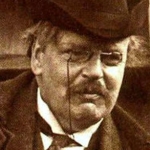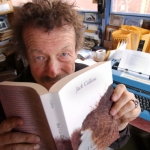Katie by Henry Timrod

It may be through some foreign grace,
And unfamiliar charm of face;
It may be that across the foam
Which bore her from her childhood’s home,
By some strange spell, my Katie brought,
Along with English creeds and thought—
Entangled in her golden hair—
Some English sunshine, warmth, and air!
Read Poem And unfamiliar charm of face;
It may be that across the foam
Which bore her from her childhood’s home,
By some strange spell, my Katie brought,
Along with English creeds and thought—
Entangled in her golden hair—
Some English sunshine, warmth, and air!
0
A Thousand Words by Daryl Hine

Ce qui est beau à Leningrad, c’est Saint Petersbourg.
What fellow traveller returned from the U.S.S.R.,
Burdened with souvenirs in the form of second thoughts, said
That, rephrasing the Slavic platitude as a reactionary epigram? Thence
One must count oneself privileged to have escaped empty-handed,
Frisked in exit by the incompetent customs of the country
Who got everything backwards, inspecting my papers with a glass:
Bourgeois formalism apart, my handwriting looks like a decadent cipher.
Read Poem What fellow traveller returned from the U.S.S.R.,
Burdened with souvenirs in the form of second thoughts, said
That, rephrasing the Slavic platitude as a reactionary epigram? Thence
One must count oneself privileged to have escaped empty-handed,
Frisked in exit by the incompetent customs of the country
Who got everything backwards, inspecting my papers with a glass:
Bourgeois formalism apart, my handwriting looks like a decadent cipher.
0
Five Visions of Captain Cook by Kenneth Slessor

I
Cook was a captain of the Admiralty
When sea-captains had the evil eye,
Or should have, what with beating krakens off
And casting nativities of ships;
Cook was a captain of the powder-days
When captains, you might have said, if you had been
Fixed by their glittering stare, half-down the side,
Read Poem Cook was a captain of the Admiralty
When sea-captains had the evil eye,
Or should have, what with beating krakens off
And casting nativities of ships;
Cook was a captain of the powder-days
When captains, you might have said, if you had been
Fixed by their glittering stare, half-down the side,
0
For “Fiddle-de-de” by John Hollander

“What’s the French for fiddle-de-dee?” “Fiddle-de-dee’s not English,” Alice replied gravely. “Whoever said it was,” said the Red queen ... What’s the French for “fiddle-de-dee”?
But “fiddle-de-dee’s not English” (we
Read Poem But “fiddle-de-dee’s not English” (we
0
Wildflowers by Richard Howard

for Joseph Cady
Camden, 1882 Is it raining, Mary, can you see?
Read Poem Camden, 1882 Is it raining, Mary, can you see?
0
Incidents of Travel in Poetry by Frank Lima

Happy Birthday Kenneth Koch/Feb 27 We went to all those places where they restore sadness and joy
and call it art. We were piloted by Auden who became
Unbearably acrimonious when we dropped off Senghor into the
steamy skies of his beloved West Africa. The termites and ants
Read Poem and call it art. We were piloted by Auden who became
Unbearably acrimonious when we dropped off Senghor into the
steamy skies of his beloved West Africa. The termites and ants
0
The Rolling English Road by G. K. Chesterton

Before the Roman came to Rye or out to Severn strode,
The rolling English drunkard made the rolling English road.
A reeling road, a rolling road, that rambles round the shire,
And after him the parson ran, the sexton and the squire;
A merry road, a mazy road, and such as we did tread
The night we went to Birmingham by way of Beachy Head.
I knew no harm of Bonaparte and plenty of the Squire,
And for to fight the Frenchman I did not much desire;
Read Poem The rolling English drunkard made the rolling English road.
A reeling road, a rolling road, that rambles round the shire,
And after him the parson ran, the sexton and the squire;
A merry road, a mazy road, and such as we did tread
The night we went to Birmingham by way of Beachy Head.
I knew no harm of Bonaparte and plenty of the Squire,
And for to fight the Frenchman I did not much desire;
0
Don Juan: Canto 11 by Lord Byron (George Gordon)

I
When Bishop Berkeley said "there was no matter,"
And proved it—'twas no matter what he said:
They say his system 'tis in vain to batter,
Too subtle for the airiest human head;
And yet who can believe it! I would shatter
Gladly all matters down to stone or lead,
Or adamant, to find the World a spirit,
And wear my head, denying that I wear it.
II
What a sublime discovery 'twas to make the
Universe universal egotism,
That all's ideal—all ourselves: I'll stake the
World (be it what you will) that that's no schism.
Read Poem When Bishop Berkeley said "there was no matter,"
And proved it—'twas no matter what he said:
They say his system 'tis in vain to batter,
Too subtle for the airiest human head;
And yet who can believe it! I would shatter
Gladly all matters down to stone or lead,
Or adamant, to find the World a spirit,
And wear my head, denying that I wear it.
II
What a sublime discovery 'twas to make the
Universe universal egotism,
That all's ideal—all ourselves: I'll stake the
World (be it what you will) that that's no schism.
0
from The Prodigal: 10 by Derek Walcott

I
The ground dove stuttered for a few steps then flew
up from his path to settle in the sun-browned
branches that were now barely twigs; in drought it coos
with its relentless valve, a tiring sound,
not like the sweet exchanges of turtles in the Song
of Solomon, or the flutes of Venus in frescoes
though all the mounds in the dove-calling drought
Read Poem The ground dove stuttered for a few steps then flew
up from his path to settle in the sun-browned
branches that were now barely twigs; in drought it coos
with its relentless valve, a tiring sound,
not like the sweet exchanges of turtles in the Song
of Solomon, or the flutes of Venus in frescoes
though all the mounds in the dove-calling drought
0
Speech: “Once more unto the breach, dear friends, once more” by William Shakespeare

(from Henry V, spoken by King Henry) Once more unto the breach, dear friends, once more;
Or close the wall up with our English dead.
In peace there's nothing so becomes a man
As modest stillness and humility:
Read Poem Or close the wall up with our English dead.
In peace there's nothing so becomes a man
As modest stillness and humility:
0
Lob by Edward Thomas

At hawthorn-time in Wiltshire travelling
In search of something chance would never bring,
An old man’s face, by life and weather cut
And coloured,—rough, brown, sweet as any nut,—
A land face, sea-blue-eyed,—hung in my mind
When I had left him many a mile behind.
All he said was: “Nobody can’t stop ’ee. It’s
A footpath, right enough. You see those bits
Of mounds—that’s where they opened up the barrows
Sixty years since, while I was scaring sparrows.
They thought as there was something to find there,
But couldn’t find it, by digging, anywhere.”
To turn back then and seek him, where was the use?
There were three Manningfords,—Abbots, Bohun, and Bruce:
Read Poem In search of something chance would never bring,
An old man’s face, by life and weather cut
And coloured,—rough, brown, sweet as any nut,—
A land face, sea-blue-eyed,—hung in my mind
When I had left him many a mile behind.
All he said was: “Nobody can’t stop ’ee. It’s
A footpath, right enough. You see those bits
Of mounds—that’s where they opened up the barrows
Sixty years since, while I was scaring sparrows.
They thought as there was something to find there,
But couldn’t find it, by digging, anywhere.”
To turn back then and seek him, where was the use?
There were three Manningfords,—Abbots, Bohun, and Bruce:
0
Fresh Air by Kenneth Koch

I
At the Poem Society a black-haired man stands up to say
“You make me sick with all your talk about restraint and mature talent!
Haven’t you ever looked out the window at a painting by Matisse,
Or did you always stay in hotels where there were too many spiders crawling on your visages?
Did you ever glance inside a bottle of sparkling pop,
Or see a citizen split in two by the lightning?
I am afraid you have never smiled at the hibernation
Read Poem At the Poem Society a black-haired man stands up to say
“You make me sick with all your talk about restraint and mature talent!
Haven’t you ever looked out the window at a painting by Matisse,
Or did you always stay in hotels where there were too many spiders crawling on your visages?
Did you ever glance inside a bottle of sparkling pop,
Or see a citizen split in two by the lightning?
I am afraid you have never smiled at the hibernation
0
from Each in a Place Apart by James McMichael

I know I’ll lose her.
One of us will decide. Linda will say she can’t
do this anymore or I’ll say I can’t. Confused
only about how long to stay, we’ll meet and close it up.
She won’t let me hold her. I won’t care that my
eyes still work, that I can lift myself past staring.
Nothing from her will reach me after that.
I’ll drive back to them, their low white T-shaped house
Read Poem One of us will decide. Linda will say she can’t
do this anymore or I’ll say I can’t. Confused
only about how long to stay, we’ll meet and close it up.
She won’t let me hold her. I won’t care that my
eyes still work, that I can lift myself past staring.
Nothing from her will reach me after that.
I’ll drive back to them, their low white T-shaped house
0
from Four Good Things by James McMichael

The mountain north of Pasadena has severe
and angular back canyons where the light is always
unexpected, out of place, too simple for the
clutter of the granite blocks along the creeks.
The slopes have low rough shrubs, some firebreaks.
It rains sometimes, and then the soils wash easily
through Rubio and Eaton canyons to the small
catch-basins and the storage tanks. The bedrocks
Read Poem and angular back canyons where the light is always
unexpected, out of place, too simple for the
clutter of the granite blocks along the creeks.
The slopes have low rough shrubs, some firebreaks.
It rains sometimes, and then the soils wash easily
through Rubio and Eaton canyons to the small
catch-basins and the storage tanks. The bedrocks
0
An Immigrant Woman by Anne Winters

PART ONE
I
Slip-pilings on the Brooklyn littoral
—the poles still tarry, flimsy; the ferry terminus
with its walledup doors wan doorshapes
on eroded sills. Downstream, the strutwork
of the Williamsburg cable tower
threw its cool shadow half a mile inland
Read Poem I
Slip-pilings on the Brooklyn littoral
—the poles still tarry, flimsy; the ferry terminus
with its walledup doors wan doorshapes
on eroded sills. Downstream, the strutwork
of the Williamsburg cable tower
threw its cool shadow half a mile inland
0
The Soldier by Rupert Brooke

If I should die, think only this of me:
That there’s some corner of a foreign field
That is for ever England. There shall be
In that rich earth a richer dust concealed;
A dust whom England bore, shaped, made aware,
Gave, once, her flowers to love, her ways to roam;
A body of England’s, breathing English air,
Washed by the rivers, blest by suns of home.
Read Poem That there’s some corner of a foreign field
That is for ever England. There shall be
In that rich earth a richer dust concealed;
A dust whom England bore, shaped, made aware,
Gave, once, her flowers to love, her ways to roam;
A body of England’s, breathing English air,
Washed by the rivers, blest by suns of home.
0
from The True Born Englishman by Daniel Defoe

Thus from a mixture of all kinds began,
That het’rogeneous thing, an Englishman:
In eager rapes, and furious lust begot,
Betwixt a painted Britain and a Scot.
Whose gend’ring off-spring quickly learn’d to bow,
And yoke their heifers to the Roman plough:
From whence a mongrel half-bred race there came,
With neither name, nor nation, speech nor fame.
Read Poem That het’rogeneous thing, an Englishman:
In eager rapes, and furious lust begot,
Betwixt a painted Britain and a Scot.
Whose gend’ring off-spring quickly learn’d to bow,
And yoke their heifers to the Roman plough:
From whence a mongrel half-bred race there came,
With neither name, nor nation, speech nor fame.
0
A Dialogue between Old England and New by Anne Bradstreet

New England.
Alas, dear Mother, fairest Queen and best,
With honour, wealth, and peace happy and blest,
What ails thee hang thy head, and cross thine arms,
And sit i’ the dust to sigh these sad alarms?
What deluge of new woes thus over-whelm
The glories of thy ever famous Realm?
What means this wailing tone, this mournful guise?
Ah, tell thy Daughter; she may sympathize.
Old England.
Art ignorant indeed of these my woes,
Or must my forced tongue these griefs disclose,
And must my self dissect my tatter’d state,
Which Amazed Christendom stands wondering at?
Read Poem Alas, dear Mother, fairest Queen and best,
With honour, wealth, and peace happy and blest,
What ails thee hang thy head, and cross thine arms,
And sit i’ the dust to sigh these sad alarms?
What deluge of new woes thus over-whelm
The glories of thy ever famous Realm?
What means this wailing tone, this mournful guise?
Ah, tell thy Daughter; she may sympathize.
Old England.
Art ignorant indeed of these my woes,
Or must my forced tongue these griefs disclose,
And must my self dissect my tatter’d state,
Which Amazed Christendom stands wondering at?
0
In the Bay by Algernon Charles Swinburne

I
Beyond the hollow sunset, ere a star
Take heart in heaven from eastward, while the west,
Fulfilled of watery resonance and rest,
Is as a port with clouds for harbour bar
To fold the fleet in of the winds from far
That stir no plume now of the bland sea's breast:
II
Above the soft sweep of the breathless bay
Southwestward, far past flight of night and day,
Lower than the sunken sunset sinks, and higher
Than dawn can freak the front of heaven with fire,
My thought with eyes and wings made wide makes way
To find the place of souls that I desire.
Read Poem Beyond the hollow sunset, ere a star
Take heart in heaven from eastward, while the west,
Fulfilled of watery resonance and rest,
Is as a port with clouds for harbour bar
To fold the fleet in of the winds from far
That stir no plume now of the bland sea's breast:
II
Above the soft sweep of the breathless bay
Southwestward, far past flight of night and day,
Lower than the sunken sunset sinks, and higher
Than dawn can freak the front of heaven with fire,
My thought with eyes and wings made wide makes way
To find the place of souls that I desire.
0
